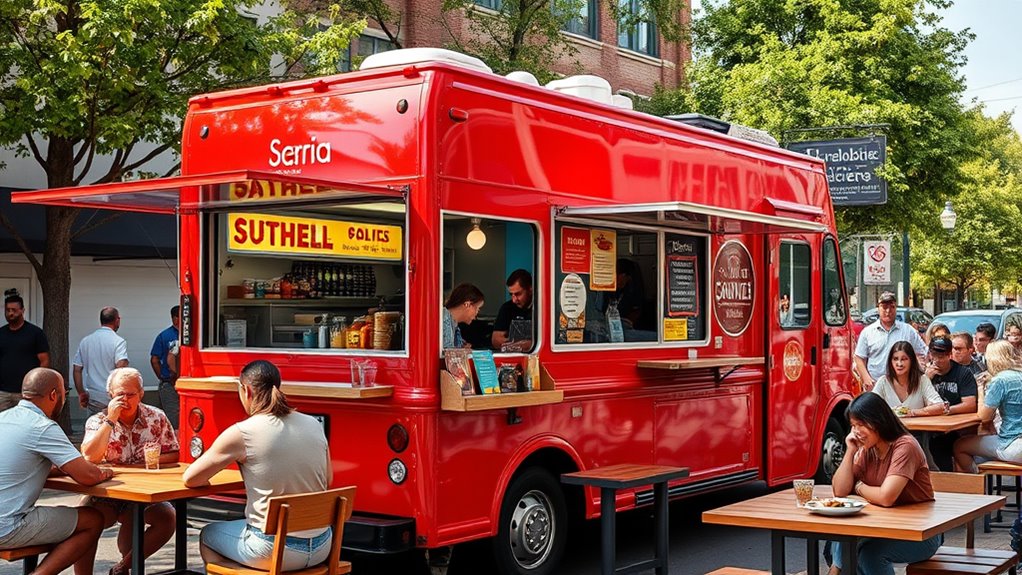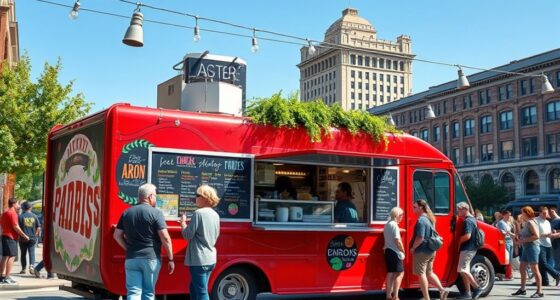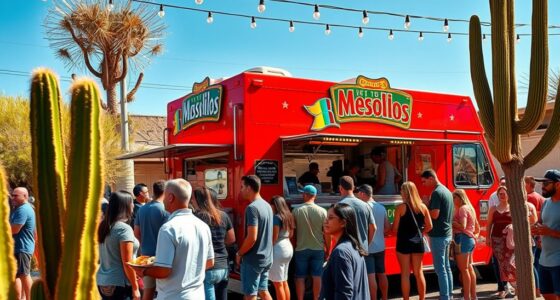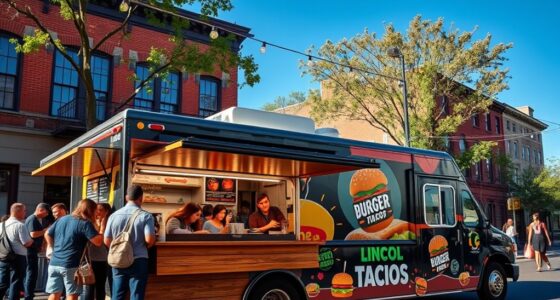To start a food truck in Greensboro, NC, you should first understand local requirements like permits, inspections, and designated zones. Leverage the city’s vibrant food scene by creating locally inspired menus and engaging with community events to build loyalty. Plan your finances carefully, explore grants, and choose the right truck size and tech tools for smooth operations. Exploring Greensboro’s lively food truck scene will give you insights to grow your business successfully.
Key Takeaways
- Research Greensboro’s local permits, zoning, and health regulations to ensure compliance before launching your food truck.
- Develop a menu inspired by Greensboro’s culture, emphasizing local ingredients and regional flavors to attract community support.
- Secure funding through grants, loans, or personal savings, and purchase or lease a suitable food truck with necessary equipment.
- Obtain shared kitchen licensing, set up secure payment systems, and plan your operational infrastructure for efficiency.
- Engage with Greensboro’s vibrant community through social media, local events, and collaborations to build loyalty and increase visibility.
Vibrant Greensboro Food Scene
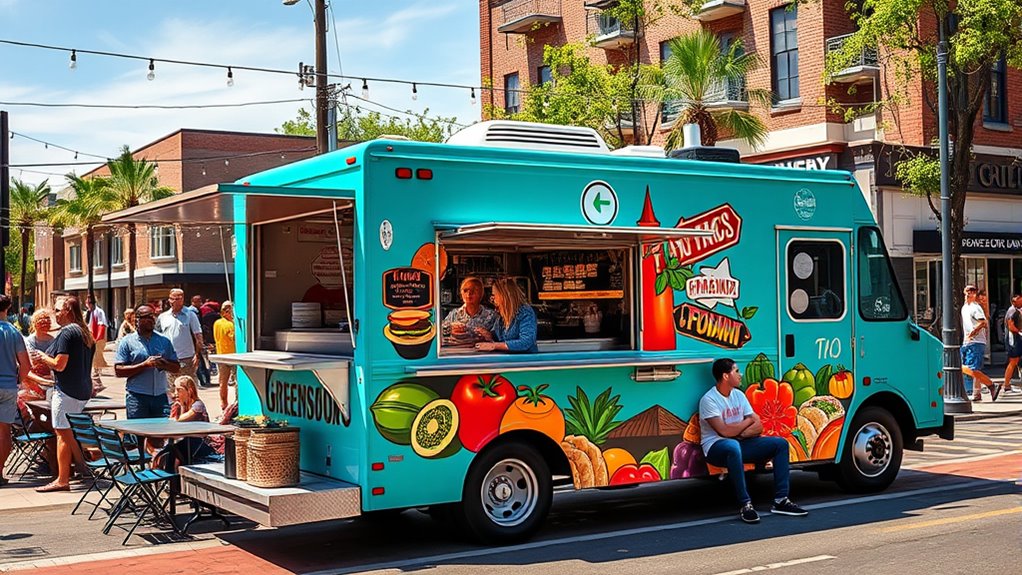
Have you ever wondered what makes Greensboro’s food scene so lively? It’s the mix of diverse flavors and innovative concepts that draw people in. As a food truck owner, you can stand out through effective food truck branding, creating a memorable identity that resonates with locals and visitors alike. Menu customization is another key to success—you can tailor your offerings to meet evolving tastes or showcase unique dishes that reflect Greensboro’s cultural diversity. This flexibility allows you to experiment and adapt, keeping your truck fresh and exciting. The vibrant atmosphere of Greensboro encourages creativity and community engagement, making it an ideal place to launch a food truck that’s both distinctive and responsive to local preferences. To truly thrive, understanding the local food scene and incorporating regional ingredients can help you craft authentic and appealing dishes.
Understanding Local Requirements
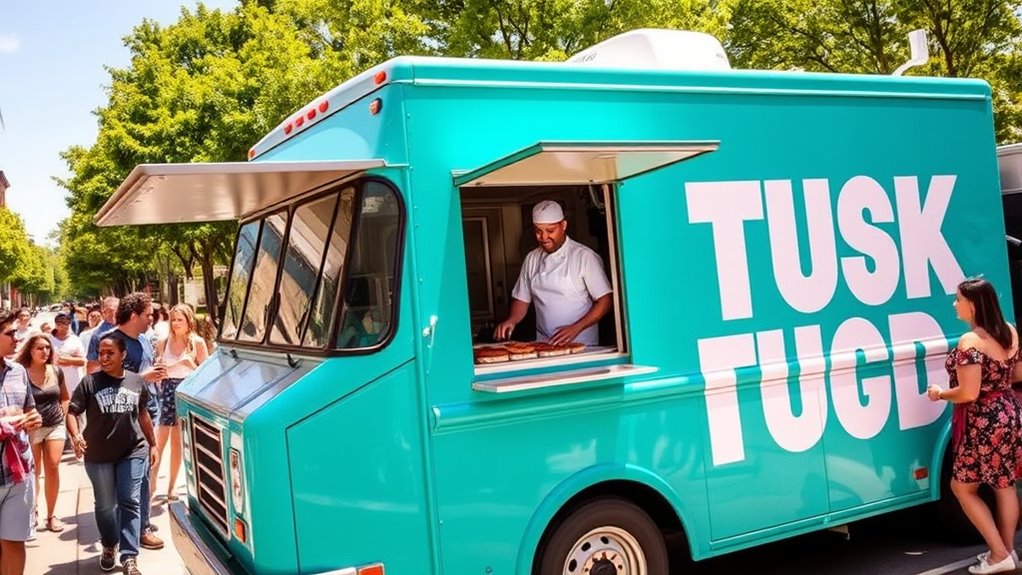
To get started, you should familiarize yourself with Greensboro’s online permit application process to save time and guarantee compliance. It’s also important to know how often inspections are scheduled so you can plan accordingly. Finally, understanding designated food truck zones helps you choose the best spots and avoid penalties.
Online Permit Application Process
Getting around Greensboro’s online permit application process is essential for food truck operators to get started smoothly. The online permit simplifies submitting your application, saving time and reducing paperwork. To begin, visit the city’s official website and locate the online application portal. You’ll need to create an account and gather necessary documents, such as your business license and vehicle information. Carefully fill out each section of the online permit application, ensuring all details are accurate. Double-check for completeness before submitting. Once submitted, you’ll receive confirmation and instructions for any additional steps. Staying organized and attentive during this process helps prevent delays. Understanding the online permit application process ensures you meet local requirements efficiently, allowing you to focus on launching your food truck business in Greensboro.
Schedule Inspection Frequency Requirements
Understanding the local requirements for scheduling inspection frequency is essential for maintaining compliance and avoiding delays in your food truck operation. Greensboro’s health department typically sets a specific inspection schedule based on your food truck’s operations and past compliance history. You need to adhere to this compliance frequency to ensure your food truck remains in good standing. Regular inspections help catch issues early and demonstrate your commitment to food safety. Failing to follow the required inspection schedule can lead to fines or temporary shutdowns. Stay proactive by knowing when your next inspection is due and prepare accordingly. Keeping up with these requirements not only keeps your food truck compliant but also builds trust with customers and health officials alike.
Designated Food Truck Zones
Greensboro designates specific zones where food trucks are allowed to operate, guaranteeing smooth traffic flow and public safety. These designated food truck zones help manage parking regulations by preventing congestion and keeping streets accessible to pedestrians and vehicles. Before setting up, you must verify that your truck is compliant with local health inspection standards, as these zones often require proof of recent inspections. Knowing where you can park and sell is vital, so consult city maps and regulations to identify approved areas. Additionally, confirm your vehicle’s parking aligns with posted signage and local ordinances. By adhering to these designated zones and regulations, you’ll avoid fines and disruptions, making your food truck operation more efficient and compliant with Greensboro’s requirements.
Setting Up Your Base of Operations

Choosing the right shared kitchen licensing options can simplify your setup process and guarantee you meet local regulations. You’ll also want to select custom kitchen appliances that fit your menu and space constraints. These steps set a strong foundation for your food truck’s operations in Greensboro. Additionally, considering merchant services can help streamline your payment processing and improve customer experience from the start.
Shared Kitchen Licensing Options
Setting up your food truck often involves steering through various licensing options for shared kitchens, which can serve as your operational base. Shared kitchen licensing allows you to operate within a facility that meets health and safety standards without building your own commercial kitchen from scratch. These cooperative kitchen regulations are designed to streamline licensing processes and reduce costs for food entrepreneurs. When choosing a shared kitchen, verify that it complies with local health department requirements and has the necessary permits. Many shared kitchen spaces in Greensboro offer flexible arrangements, making it easier for you to start cooking and preparing food legally. Understanding these licensing options ensures you stay compliant while focusing on growing your food truck business efficiently.
Custom Kitchen Appliances Selection
Selecting the right custom kitchen appliances is essential to creating an efficient and reliable base of operations for your food truck. Your appliance selection tips should focus on durability, space efficiency, and functionality. Choose appliances designed for mobile use, such as compact ovens, refrigerators, and fryers that can withstand constant movement. Prioritize models that are easy to clean and maintain, ensuring smooth daily operations. Consider your menu and cooking needs to determine which appliances are non-negotiable. Additionally, check for energy efficiency to reduce operating costs. Properly selected custom kitchen appliances will streamline your workflow, save time, and help maintain consistent quality. Remember, investing in quality equipment upfront sets the foundation for your food truck’s success in Greensboro.
Budgeting and Financing Your Food Truck
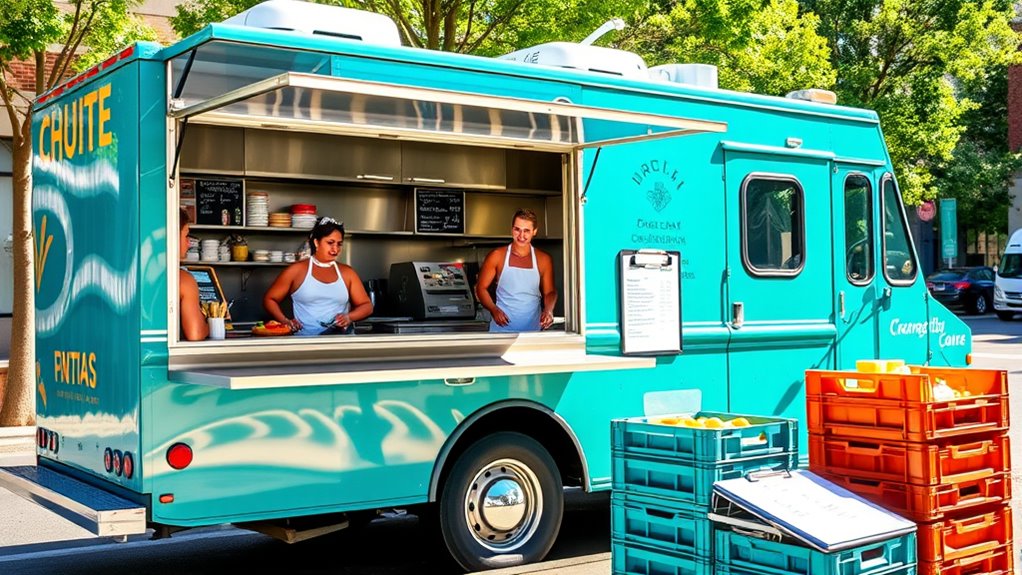
Budgeting for your food truck starts with understanding the initial purchase costs, which can vary widely. You should also explore local small business grants in Greensboro that might help ease some financial burdens. Don’t forget to include liability coverage in your budget to protect your business and assets. Additionally, reviewing best colognes can help you present a professional image as a food truck owner, boosting customer confidence.
Initial Truck Purchase Costs
Purchasing your food truck is a significant investment that requires careful budgeting and financing. The initial costs can vary widely depending on whether you buy new or used, and the truck’s size and features. Expect to spend between $20,000 and $100,000, including equipment and branding strategies to attract customers. Keep in mind that truck maintenance is an ongoing expense, so choose a reliable vehicle to minimize future repairs. When budgeting, consider:
- The purchase price of the truck itself
- Customization and equipment costs
- Initial branding and marketing expenses
A well-chosen truck can boost your brand visibility and streamline operations, making it a crucial part of your food truck startup. Careful planning now will save you headaches and money down the road.
Local Small Business Grants
Securing funding for your food truck can be challenging, but local small business grants offer a valuable resource to help offset startup costs. These grant opportunities are excellent funding sources that don’t require repayment, making them ideal for new entrepreneurs. In Greensboro, numerous organizations and government programs support small businesses, including food trucks. You should research local grants available through the Greensboro Small Business Development Center, city initiatives, and regional economic development agencies. Keep in mind that grant applications often require detailed proposals and proof of your business plan. Applying for these grants can provide essential financial assistance, reducing your reliance on loans or personal savings. Stay proactive, gather all necessary documentation, and regularly check for new grant opportunities to maximize your chances of securing funding.
Liability Coverage for Food Trucks
Since liability coverage is essential for protecting your food truck business, understanding how it fits into your overall budget and financing plan is important. Liability insurance helps shield you from costs related to accidents, injuries, or property damage. When choosing coverage, consider your coverage limits to guarantee adequate protection without overspending.
Keep these points in mind:
- Determine appropriate coverage limits based on your truck’s value and risks
- Balance the cost of liability insurance with your overall budget
- Factor in potential claims to avoid financial strain
Designing Your Menu and Pricing Strategy
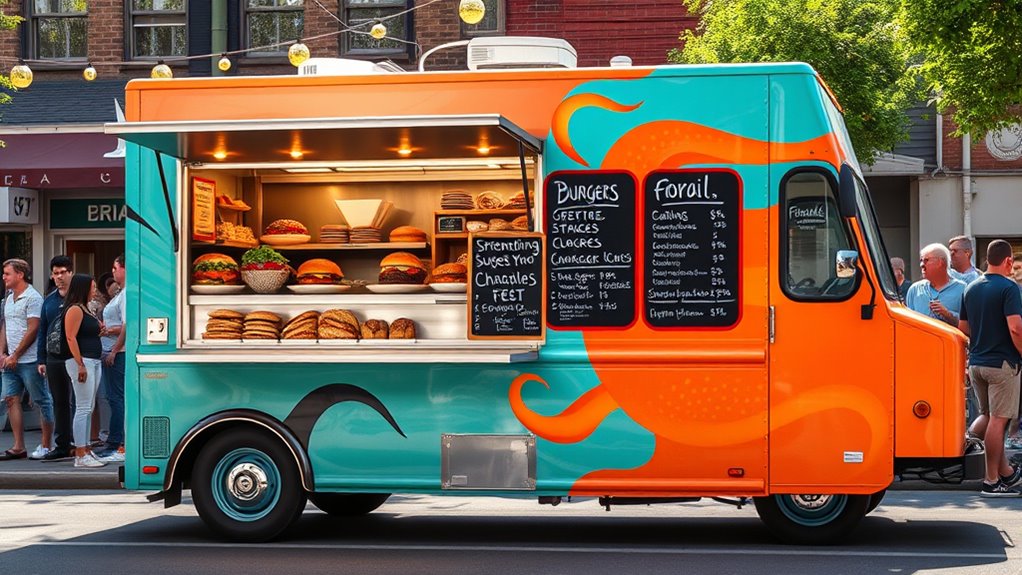
To craft a menu that appeals to Greensboro locals, focus on incorporating regional flavors and seasonal ingredients. You’ll also want to optimize the cost per dish to guarantee profitability without sacrificing quality. Balancing innovative offerings with thoughtful pricing sets the stage for a successful food truck. Additionally, understanding menu planning strategies can help you create dishes that are both popular and cost-effective.
Locally Inspired Menu Innovation
How can you create a menu that not only highlights Greensboro’s local flavors but also appeals to a diverse customer base? Focus on locally inspired menu innovation by integrating regional flavors into your dishes. This approach showcases Greensboro’s unique culinary identity and attracts locals and tourists alike. Consider featuring seasonal ingredients from nearby farms and highlighting Southern classics with a modern twist. To stand out, try:
- Incorporating barbecue, sweet potatoes, or collard greens into fusion dishes
- Offering signature sandwiches with regional meats and sauces
- Creating vegetarian options inspired by local produce
Cost per Dish Optimization
Optimizing the cost per dish starts with carefully designing your menu and setting strategic prices that balance quality and profitability. Focus on menu pricing by analyzing ingredient costs for each item, ensuring you cover expenses while remaining competitive. Use ingredient costs to determine the minimum price needed to break even, then add a markup that reflects your target profit margin. Keep your menu concise, highlighting dishes with high margins to maximize revenue. Regularly review ingredient prices and adjust menu prices accordingly to maintain profitability. Avoid overcomplicating your menu, which can lead to waste and increased costs. By thoughtfully managing menu pricing and ingredient costs, you’ll ensure each dish contributes to your food truck’s financial health while delighting customers.
Technology and Operations
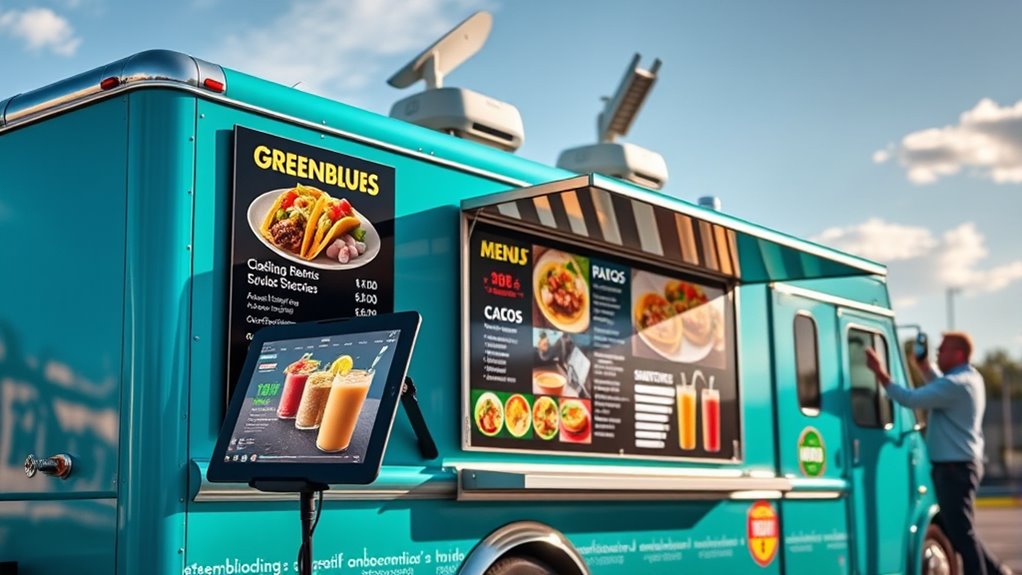
Using wireless payment terminals lets you accept payments quickly and move smoothly between locations. A mobile POS system helps you manage sales and inventory on the go, saving you time and headaches. Keeping track of stock digitally guarantees you stay prepared and avoid running out of popular items during busy hours. Incorporating sustainability practices into your operations can also enhance your brand image and appeal to environmentally conscious customers.
Wireless Payment Terminals for Mobility
Wireless payment terminals have become essential for food trucks seeking seamless and efficient transactions on the move. They enable quick, secure payments, especially through contactless payments, reducing wait times and enhancing customer satisfaction. With wireless terminals, you can process payments anywhere, increasing sales during busy hours. These devices also support inventory management by integrating sales data in real-time, helping you track stock levels effortlessly.
Consider these benefits:
- Accept contactless payments like Apple Pay and Google Pay for faster checkout
- Improve inventory management with real-time sales updates
- Reduce cash handling risks and streamline operations
Investing in reliable wireless payment terminals ensures your food truck runs smoothly, keeps customers happy, and adapts to the fast-paced environment of Greensboro’s food scene.
Mobile POS and Stock Tracking
Implementing a mobile POS system can transform how your food truck manages sales and inventory on the go. Digital payment systems allow customers to pay quickly and securely, reducing wait times and improving the customer experience. With a mobile POS, you can track sales in real-time, making inventory management more accurate and efficient. You’ll instantly see which items sell fastest and identify stock shortages before they become a problem. Integrating inventory management tools with your POS helps you monitor ingredient levels, manage reorder points, and prevent waste. This seamless technology streamlines daily operations, saves you time, and keeps your food truck running smoothly. By leveraging mobile POS and stock tracking, you’ll enhance both customer satisfaction and your overall efficiency.
Marketing and Growing Your Presence
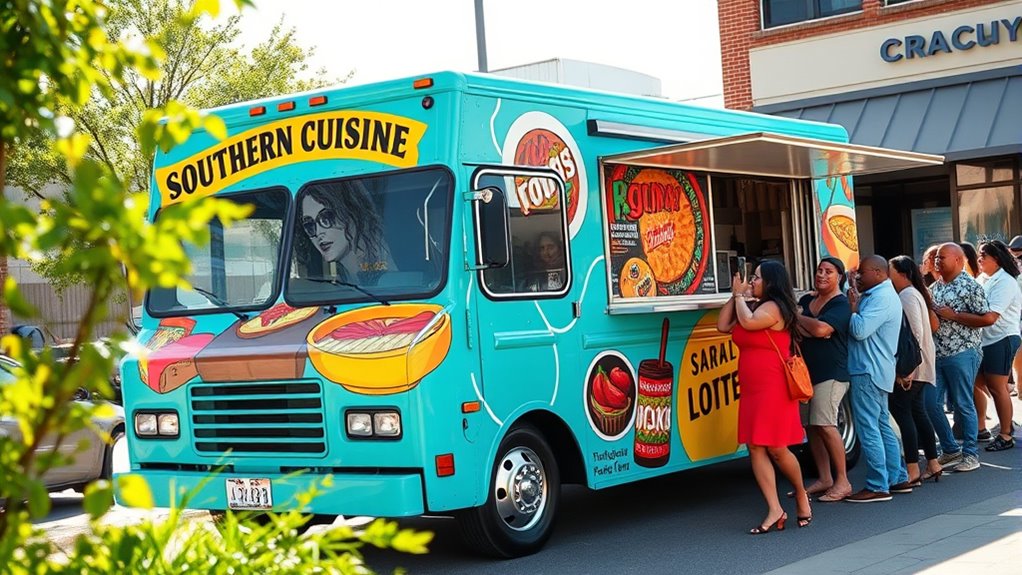
To boost your food truck’s visibility, focus on scheduling your appearances at popular events when foot traffic is high. Connecting with local food bloggers can also help spread the word and attract new customers. These strategies can considerably grow your presence in Greensboro’s vibrant food scene.
Popular Event Scheduling Tips
Scheduling your food truck events strategically is essential for maximizing attendance and growing your presence in Greensboro. Well-planned event scheduling helps you reach different audiences and boost visibility. To do this effectively, consider:
- Aligning your events with local festivals and busy weekends to tap into larger crowds
- Using seasonal promotions to attract customers during holidays or changing weather
- Varying locations and times to increase exposure and discover your ideal customer base
Engaging Local Food Bloggers
Connecting with local food bloggers can considerably boost your food truck’s visibility in Greensboro. These bloggers have established audiences interested in local food pairing and culinary trend analysis, making them ideal partners to showcase your menu. Reach out to offer samples or invite them to exclusive tasting events. When they share their experiences online, your truck gains authentic exposure to a wider community. Focus on building genuine relationships rather than one-off promotions, and stay updated on current food trends to inspire content that resonates. Collaborating with bloggers helps position your truck within Greensboro’s vibrant food scene, attracting both locals and visitors keen to explore new flavors. Consistent engagement with these influencers can notably grow your presence and reputation in the area.
Greensboro Food Truck Community
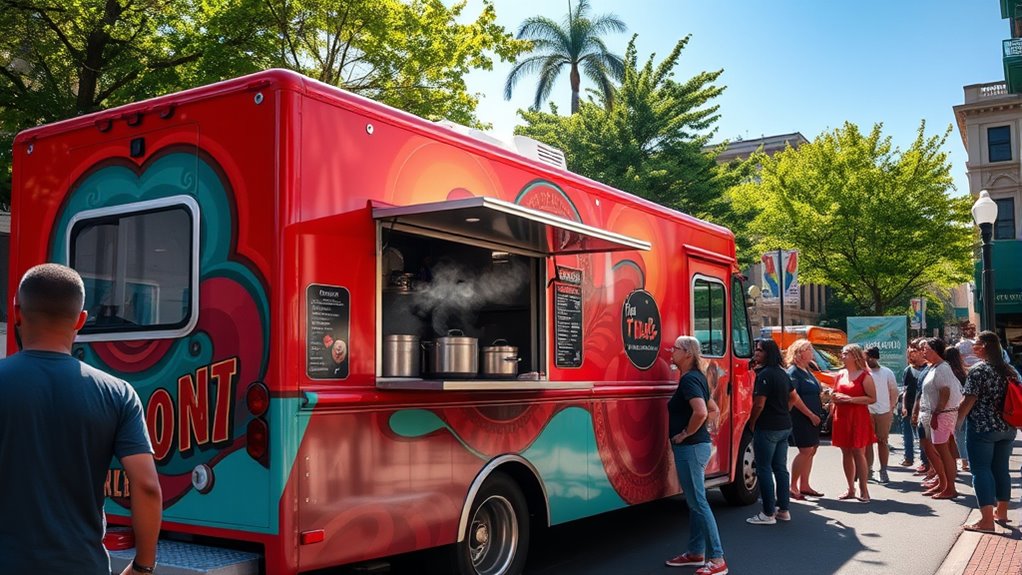
Ever wondered what makes Greensboro’s food truck scene so vibrant? It’s the strong sense of community and innovative food truck branding that keep everyone engaged. Local trucks often team up for events, fostering a lively atmosphere you won’t find elsewhere. They connect with customers through:
- Social media campaigns and local collaborations
- Participating in community festivals and charity events
- Offering unique, locally inspired menus that reflect Greensboro’s culture
This active community engagement helps build loyal customers and boosts your food truck’s visibility. By tapping into these relationships, you’ll create a memorable experience that keeps people coming back. The Greensboro food truck community thrives on collaboration, making it a perfect place to start your culinary journey.
Frequently Asked Questions
What Permits Are Needed for Nighttime Food Truck Operations in Greensboro?
You’ll need to obtain nighttime permits for your food truck to operate after regular hours in Greensboro. Check with local regulations and the Greensboro Planning and Development Department to understand specific requirements. Usually, you’ll need a special event or nighttime operation permit, along with your standard food service and health permits. Make sure to conform to noise ordinances and parking rules as well. Securing these permits ensures smooth, legal nighttime food truck operations.
How Can I Find Reliable Local Suppliers for Ingredients in Greensboro?
To find reliable local suppliers for ingredients in Greensboro, you should explore farmers’ markets, like the Greensboro Farmers Curb Market, and connect with local farms for fresh produce. You can also join regional food co-ops or online platforms dedicated to ingredient sourcing. Building relationships with these vendors guarantees you get quality local produce consistently, supporting your food truck’s reputation for fresh, authentic flavors.
Are There Specific Health Inspection Standards Unique to Greensboro?
Did you know Greensboro has over 1,200 food establishments, highlighting its vibrant culinary scene? When it comes to health inspection standards, Greensboro follows strict local health regulations aligned with North Carolina state laws. You’ll need to pass regular inspection procedures covering sanitation, food handling, and equipment safety. Staying compliant guarantees your food truck operates smoothly, keeps customers safe, and maintains your reputation in the community.
What Are the Common Challenges Faced by First-Time Food Truck Owners Here?
As a first-time food truck owner in Greensboro, you’ll face challenges like menu planning to appeal locally and managing vehicle maintenance to avoid breakdowns. Balancing inventory, ensuring consistent quality, and steering local health regulations also pose hurdles. Staying organized and proactive helps you handle these issues effectively, so you can focus on serving delicious food and building a loyal customer base. Keep learning and adapting to thrive in Greensboro’s vibrant food scene.
How Can I Connect With Other Successful Food Truck Entrepreneurs in Greensboro?
Think of Greensboro’s food truck community as a thriving garden—you’ll want to water it with connections. Attend local networking events and join social media groups focused on food trucks in Greensboro. These platforms are your gateway to meeting successful entrepreneurs, sharing tips, and forming collaborations. By actively engaging, you’ll cultivate relationships that can lead to advice, partnerships, and growth opportunities, helping your food truck business flourish.
Conclusion
Starting your food truck in Greensboro is like planting a seed that can grow into a thriving community. With passion, planning, and persistence, you’ll bring delicious flavors to the streets and build lasting connections. Embrace the vibrant local scene and stay adaptable as you navigate challenges. Your unique culinary journey can shine brighter than the city lights, turning your dream into a flavorful reality that everyone will remember. The adventure begins with you—ready to hit the road?
